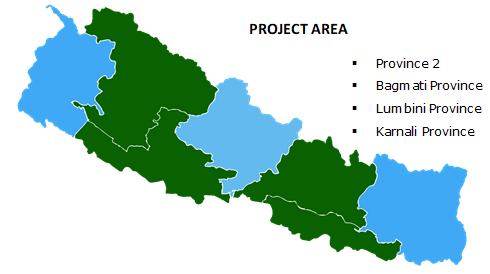RPSF-APIA
Objective
“To Minimize impact of COVID-19 on livelihoods, resilience and food security on poor and vulnerable rural people and accelerate economic recovery by enabling a substantial increase in investment in the small-scale agricultural sector in supported states and improved access to digital services.”
Major Highlights
Project Duration
- Up to June 2022
Target Beneficiaries
- 20,000 persons receiving services promoted or supported by the program.
- 50% women and 30% youth beneficiaries.
- Number Of Kisan Credit Cards and Kisan Apps Disbursed by the End of the Project: 20,000
Funding Agency
- International Fund for Agriculture Development (IFAD)
Supporting Agency
- The Government of Nepal (GON)
- Ministry of Finance
Implementing Institution
- Agricultural Development Bank Ltd.
Project Description
RPSF-APIA is a project of the Government of Nepal with grant support from IFAD and implemented by Agricultural Development Bank Limited (ADBL). The project aims to sustain and inclusive growth to allow poor, marginalized and climate vulnerable communities to benefit more substantially from economic growth and socio-economic development. The project’s goals are also strongly aligned with the objectives of the Agriculture Development Strategy, the Ministry of Agriculture and Livestock Development’s (MOALD) long term vision of “protective agriculture and secured saving” and the continuing efforts to increase lending to agriculture being led by NRB through its deprived and priority sector lending policies, digitalization of financial services and financial inclusion road map.
RPSF also contributes to the national priorities on agriculture in the context of COVID-19 – both in terms of expanding production for food security and in driving rural economic recovery and creating opportunities for returning migrants. Widespread access to mainstream finance for investment and other rural financial services (such as payments, insurance, remittances, and savings) are the key enablers for accelerating private investment in agriculture to achieve these objectives.
With an 18-month duration, RPSF-APIA will focus on expanding financial and digital services through Kisan Credit Cards and Kisan Mobile APPS to ADBL’s client base as well as beneficiaries of ASDP, RERP and VITA projects. “Kisan Credit Card” and “Kisan Mobile App” have also been identified as high priority services for small farmers by GON in its annual budget and program for FY 2077/78 (FY 2020/21) and Monitory Policy.
The target group of the project will comprise of small-scale producers, traders, processors, wholesalers, retailers including input suppliers and agro-vet traders from the selected supply chains. With the objective to minimize impact of COVID-19 on livelihoods, resilience and food security, the project will focus on extensively expanding the service platform of ADBL to increase the access of farmers to institutional financial services and agriculture market information.
With its major impetus on digitalization, RPSF-APIA aims to build resilience should there be a similar crisis creating disruptions in the agricultural finance systems. The project will facilitate access to markets by offering digitalized information and support interventions on the demand side by offering them digitalised financials services via the Kisan Card and Kishan Mobile App in a way that will allow them to make payments even in situations when bank branches are under lockdown and physical transactions becomes unfeasible. On the supply side, RPSF-APIA will also assist in improving the efficiency and timeliness of the financial services provided by ADBL by assisting the bank to automate loan processing in a way that will allow them to increase outreach and expand and deepen financial services to the small-scale producers.
The proposed project will catalyse the process of digitalization of agricultural financial services in Nepal and thereby provide small-scale farmers with modern financial services. This will help them recover and rehabilitate their enterprises and thereby restore livelihood sources and the initiatives undertaken will be dove-tailed and carried forward under VITA. Such an exit strategy will not only sustain benefits provided to the smallholder farmers but also help ADBL to modernise the financial services it provides and thereby strengthen its business model and enhance institutional sustainability. Most importantly, in the longer term the initiatives catalysed under the project and carried forward under VITA will contribute to substantially enhance the resilience of the small holders’ farmers in facing COVID-19 like crisis in future
Project Area

Contact Details
- PROJECT MANAGEMENT UNIT
- AGRICULTURAL DEVELOPMENT BANK LIMITED
- PHONE: 01-4262929
- Email: pmu.adbl@adbl.gov.np
- Website: www.adbl.gov.np

